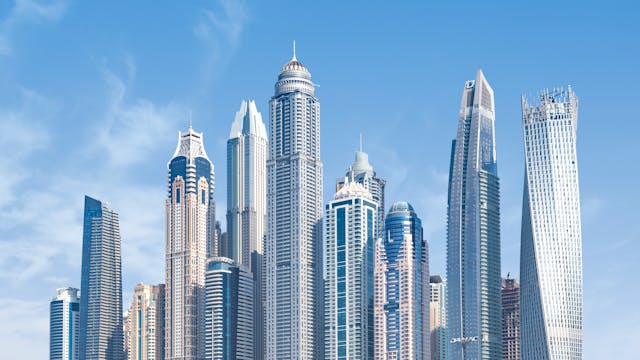Business in Dubai: A Gateway to Global Markets

Dubai, a city that epitomizes opulence and innovation, has emerged as a global business hub. From its towering skyscrapers to its strategic location, Dubai offers a wealth of opportunities for entrepreneurs and multinational corporations alike. This article delves into the factors that make Dubai offshore company formation a premier destination for business, the challenges it faces, and the future outlook for its economic landscape.
The Strategic Location Advantage
Dubai’s geographic location is one of its most significant advantages. Positioned at the crossroads of Europe, Asia, and Africa, it serves as a gateway to a market of over 2 billion people within a 4-hour flight radius. This strategic positioning has made Dubai a crucial link in global trade routes, fostering its role as a logistics and transport hub. The city’s state-of-the-art infrastructure, including the world-renowned Jebel Ali Port and Al Maktoum International Airport, facilitates seamless connectivity, enhancing its attractiveness for international trade and commerce.
Business-Friendly Environment
Dubai’s government has implemented numerous policies to create a business-friendly environment. The establishment of free zones, such as the Dubai International Financial Centre (DIFC) and Dubai Multi Commodities Centre (DMCC), offers companies 100% foreign ownership, tax exemptions, and full repatriation of profits. These incentives, coupled with minimal bureaucracy and streamlined procedures, significantly reduce the barriers to entry for foreign investors.
Furthermore, Dubai’s legal system, based on international standards, provides robust protection for businesses. The DIFC Courts, for instance, operate independently and adhere to common law principles, ensuring transparency and fairness in commercial disputes.
Diverse Economy
While Dubai is often associated with oil wealth, its economy is remarkably diversified. Non-oil sectors such as tourism, real estate, aviation, and financial services contribute significantly to its GDP. Tourism, in particular, plays a pivotal role, with the city attracting millions of visitors annually. Iconic attractions like the Burj Khalifa, Palm Jumeirah, and the Dubai Mall draw tourists from around the globe, bolstering the hospitality and retail sectors.
Real estate is another critical component of Dubai’s economy. The city’s skyline, punctuated by architectural marvels, reflects a booming property market that caters to both residential and commercial needs. Despite periodic fluctuations, the real estate sector remains a key driver of economic growth.
Innovation and Technology
Dubai is at the forefront of technological innovation. The government’s commitment to transforming the city into a knowledge-based economy is evident through initiatives such as Smart Dubai and Dubai Future Foundation. These programs aim to integrate advanced technologies, including blockchain, artificial intelligence, and the Internet of Things (IoT), into everyday life and business operations.
The establishment of innovation hubs, such as Dubai Internet City and Dubai Silicon Oasis, fosters a thriving ecosystem for tech startups and multinational tech giants. These hubs provide a conducive environment for research and development, collaboration, and business growth, positioning Dubai as a leader in the global tech arena.
Challenges and Considerations
Despite its many advantages, doing business in Dubai comes with certain challenges. The high cost of living and operating expenses can be a deterrent for some businesses. Office rents, utilities, and wages are relatively high compared to other global cities, which can impact profitability, especially for small and medium-sized enterprises (SMEs).
Moreover, the regulatory environment, while generally favorable, can be complex. Navigating local labor laws, visa regulations, and licensing requirements necessitates a thorough understanding of the local legal landscape. Companies often need to engage local consultants or legal advisors to ensure compliance and mitigate risks.
Sustainable Development and Future Outlook
Dubai is committed to sustainable development, aligning with the UAE Vision 2021 and Dubai Plan 2021. The city’s focus on sustainability is evident in projects like the Dubai Clean Energy Strategy 2050, which aims to make Dubai a global hub for clean energy and green economy. The strategy includes ambitious targets for renewable energy adoption, energy efficiency, and reduction of carbon footprint.
The Expo 2020, although postponed to 2021 due to the pandemic, is set to showcase Dubai’s resilience and innovation on a global stage. The event is expected to attract millions of visitors and generate significant economic activity, further cementing Dubai’s status as a premier business destination.
Conclusion
Dubai’s transformation from a small trading port to a global business hub is a testament to its visionary leadership and strategic investments. The city’s strategic location, business-friendly policies, diversified economy, and focus on innovation make it an attractive destination for businesses worldwide. While challenges exist, the opportunities far outweigh the risks, promising a bright future for those who choose to invest in Dubai’s dynamic market you can take help from business setup consultants in dubai. As Dubai continues to evolve, it remains a beacon of prosperity and a model for other cities aspiring to achieve economic excellence.











